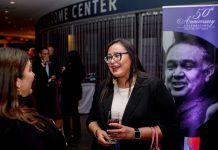Somewhere in the world, a coffee farmer’s community is being benefitted by the choice a La Mesa school made to serve his coffee and become Fair Trade certified. Even the coffee we drink can have an impact.
Many do not realize where products come from, but organizations that support Fair Trade in developing countries are trying to change that.
Somewhere in the world, a coffee farmer’s community is being benefitted by the choice a La Mesa school made to serve his coffee and become Fair Trade certified. Even the coffee we drink can have an impact.
Many do not realize where products come from, but organizations that support Fair Trade in developing countries are trying to change that.
Essentially, Fair Trade is an initiative for producers of goods in developing countries to trade environmentally friendly products with the public at fair prices that provide living wages for them, lifting communities and individuals from economic hardship.
La Mesa’s Saint Martin of Tours Academy was officially declared the first Catholic Fair Trade school in December 2015. Its Fair Trade program has gotten stronger since.
After starting with Fair Trade coffee in the lounge, today, even the benches in the playground at St. Martin are sourced ethically. Fair trade’s eco-friendly principals have also managed to imbue themselves into the school’s activities. St. martin has even recently planted a vegetable garden to provide food assistance.
According to Toni Dimuzio, the Academy’s principal, the most important thing for her is to teach students the value of Fair Trade by getting them to understand what goes on in parts of the developing world.
“There is a curriculum to it, and we want our children to know empathy, we want them to understand what is going on in other parts of the world to farmers and other producers of goods to help create a conscientiousness so that they become better consumers as they are growing and become adults,” she said.
Despite its relative youth, the program is changing mindsets already.
Administrative Assistant Anne Pacheco said the first requirement to become a Fair Trade School is to form a committee which, at St. Martin, is comprised of parents, staff and most notably, three students: 12 year old 7th grader Presley, 11 year old 6th grader Isabella and 10 year old 5th grader Zachary.
Zachary said that his school’s fair trade education changed the way he chose things in his everyday life, because one part of the curriculum is teaching the children to recognize fair trade symbols on products.
“Before we knew about it, we just bought the things we needed but now, we just look specifically for the fair trade version,” he said.
Pacheco said there are more places that are carrying fair trade now. “That’s encouraging for us,” she said.
Third grade teacher and Fair Trade Committee member Diane Hartley emphasized the importance of the Fair Trade curriculum to help open her students’ eyes to the world.
“It’s really hard for them to picture what life is like somewhere else,” she said. “So when we tell them stories of these people, that they work so hard and they barely make any money, because of this process, we can show them, this is how fair trade helps and hopefully, it opens their eyes,” she said.
A long time before the City of La Mesa became a Fair Trade town in 2012, St. Martin’s staff contemplated incorporating Fair Trade into the school.
Pacheco, who is also a Fair Trade Committee member, said they first heard about Fair Trade in San Diego back in 2005.
“We though wow, it’s like giving charity to a country, but we can make a difference by uplifting them and supporting them with what they make,” she said. “And a part of the money goes back to the communities and co-ops where they can decide democratically what to do with it.”
Pacheco added that St. Martin of Tours could have become a Fair Trade school much sooner but Fair Trade Campaigns, the organization responsible for the certification, did not have a program in place with specific requirements for schools to become Fair Trade.
When that did happen though, St. Martin dove into the opportunity.
“There’s only three steps, that’s why anybody could do this: forming the committee, putting the curriculum in the classroom and switching out for Fair Trade things,” Pacheco said. “It’s a no brainer, everybody should be able to do this. There should be hundreds of schools, catholic and non-Catholic.”
Besides the curriculum, another way Fair Trade is evident at St. Martin of Tours Academy is its Fair Trade fundraisers and gift fairs, where the community can shop for ethically sourced and eco-friendly products that range all the way from clothing and accessories to food and home décor.
The next Fair Trade gift fair will be held on October 16 at the school’s Parish Hall, to take advantage of incoming holiday season shopping.
Isabella said her favorite Fair Trade products are the soccer balls.
“I’m glad that they incorporate that with my favorite hobby, Fair Trade is going in with my favorite sport,” she said.
There is something for everyone.
“Those things are beautiful, they are different, and I know that the money I am giving is helping someone,” Hartley said.
“They make all this intricate stuff while I can’t even make a paper origami swan. “ Zachary said.
Presley agreed.
“Its amazing craftsmanship and how someone can make this by hand,” she said. “They use all the stuff around them to make beautiful art.”
The students in the committee said they planned to take what they learned about Fair Trade on to high school later.
Both Presley and Isabella said their experience in the committee is invaluable.
“Most high schools don’t have Fair Trade so I’m thinking of maybe starting my own Fair Trade committee at whatever high school I go to if they don’t have a fair trade program,” Isabella said.
“I guess I’ll take that (Fair Trade) with me everywhere I go,” Presley said. “I’ve always wanted to make the world a better place and I think fair trade is helping do that.”














